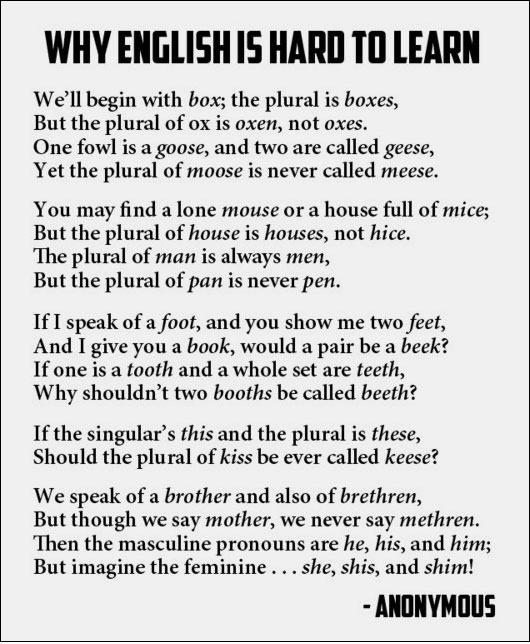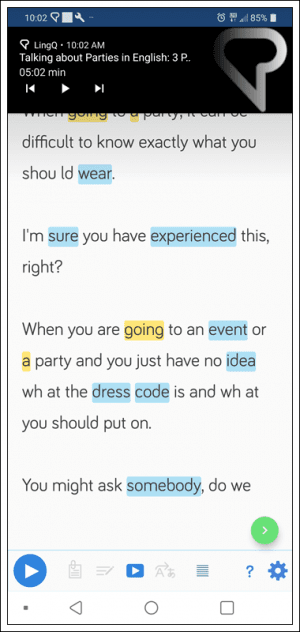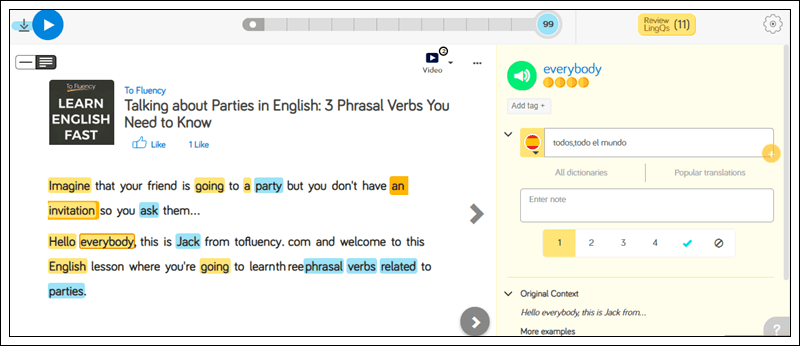Is English Hard to Learn?
We’re often asked “Is English hard to learn?” If your only purpose for learning English is to settle for the conversational basics or asking for directions and nothing further than that, then you may think that learning English is not that hard.
Most language learners, however, have higher goals for their language usage. Having such higher goals often means that the English learner is bound to find things within the language itself that aren’t so easy to learn.
Here are a few examples of just how hard learning the English language can get.
Tricky Grammar

Let’s consider the following example:
“The dog I had had had had quite a few health difficulties before I took it to the vet.”
It may seem as though someone accidentally copy-pasted the word “had” too many times, but this sentence is actually 100% grammatically correct–it makes total sense.
This is due to the wide variety of tenses in the English language. In fact, if we counted all of the English conditionals (regular and mixed) as well as the subjunctive along with all other “regular” tenses, the total number of tenses in English would be around 20. Yes, 20… I know, right?!
Furthermore, if we add the passive voice into the mix, the road to mastering English grammar definitely becomes an extremely long one.
This is not to say that learning about all of these tenses is hard. This is to say that it’s not that easy.
Game of Words
The feature of English that most learners probably find the easiest to grasp is its plural. All they need to do is add an “s” at the end of any word and they’re good to go.
There are, however, some words in English that don’t necessarily follow this same structure, e.g. the plural “men” for “man” or “women” for “woman”. Actually, “some” is not the word I’d use here. It’s way more than that–hundreds of words, to be exact. Just take your time to read and understand the following poem about “Why English Is Hard to Learn” and you’ll see what I mean.

There’s also the issue of British and American English. For various reasons, the two most globally predominant English dialects use different everyday vocabulary to indicate the same thing, e.g. “hood” (American English) vs. “bonnet” (British English) “sidewalk” vs. “pavement”, “parking lot” vs. “car park”, and so on.
Pronunciation Ambiguity
Speaking of the battle of British vs. American, there are also a handful of differences in pronunciation between the two, the most notable being accent and stress.
I’m sure that almost every English learner has had the opportunity to shake their head at just how different these two dialects sound, even though it’s still the same exact language. However, this is a topic for another time.
What I want to focus on is just how big of a difference small pronunciation variations in English, in general, can make. Consider the following examples: “pan” vs. “pen”, “sand” vs “send”, “sheet” vs. oops! That’s exactly what I mean! The differences between “a”, “e”, and their inbetweener vowel sound “æ” or a long and short vowel can be devastating for the average English learner in so many real-world scenarios. It’s something that requires a fair amount of practice and the utmost attention to detail.
This just goes to show that there are so many ways for you to sound wrong in English, and there’s nothing easy about that.
Rules of Writing
Last but not least, there are some common English mistakes even native speakers make, particularly the rules of punctuation. Oh my, oh my… People may learn how to speak, read, listen, and even write, but it is this stylistic part of writing that causes the most headaches. Whether it’s the everlasting Oxford Comma or the use of hyphens in compound nouns. I’d say that it is this area of English that requires the most learning effort out of all four language skills.
There’s also the curious case of the English pronoun “I”. If we compare it to all the other English pronouns, regardless of their type, we can notice that “I” is the only one that’s written in uppercase. I mean, why?! If all other pronouns start with a lowercase letter, why make it harder if it’s just one word?
I guess there are some things in life that you just get used to with time.
So, Is English Hard To Learn?

With the increase of online and mobile resources in today’s day and age, learning English has become easier and more affordable than ever.
Nonetheless, there’s definitely a huge difference between learning some, more or all of it. As language learners, it’s up to each and every one of us individually to determine our language goals, whether that’s merely understanding the basics or using the English language professionally, just a step behind (or ahead) of its native speakers. You are in charge of the outcome.
The higher your language learning goals are, the harder learning English is going to be. It’s that simple.
Learn English using content you love
Learning English is easier if you stop worrying about the rules…just focus on reading and listening to native material.
Over and over and over again.
Luckily for you, finding the best material to help you study has gotten easier thanks to LingQ, a language app that lets you use content you love so you can learn English.
For example, let’s say you’ve come across a YouTuber who makes great videos but maybe you have a hard time following along. Well, you can import those videos into LingQ and turn them into lessons allowing you easily read the dialogue, listen to the audio, look up each word, and save them to your library…like so:
Now you have a fully interactive lesson to help you learn English faster. LingQ also has a mobile app for both iOS and Android that allows you to study anytime, anywhere 🙂

Not only that, but once you’ve signed up for LingQ, you will have access to 100s of English lessons right away. These lessons have been professionally recorded and translated by native English speakers and are prefect for beginners. Check them out today and make a breakthrough.



